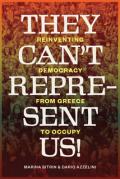Workers' Control
Translation into Italian of the article "Workers’ control at Fralib: the brand with the Elephant" published on roarmag, May 1, 2014
Controllo operaio alla Fralib
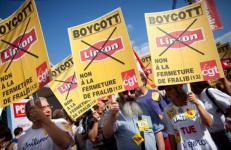
In Francia ci sono due casi di fabbriche recuperate occupate dai lavoratori nel corso della crisi attuale. Una è la fabbrica di gelati Pilpa, che ha appena avviato la produzione di gelati e yogurt biologici come società di proprietà dei lavoratori e gestita da essi dopo una lunga lotta. L’altra è la produttrice di tè Fralib. Entrambe erano state chiuse dalle loro gigantesche proprietarie multinazionali per delocalizzare la produzione.
When the big multinational Unilever shut down a tea processing plant in the south of France, the workers reacted immediately by occupying their factory.
Workers’ control at Fralib: the brand with the Elephant
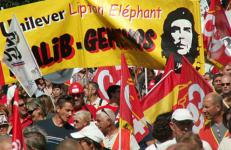
In France there are two cases of recuperated factories occupied by workers during the current crisis. One is the Pilpa Ice Cream Factory, which just started producing organic ice cream and yoghurt as a worker-owned and administered company after a long-lasting struggle. The other is the Fralib Tea Factory. Both were closed by their huge multinational owners to relocate production.
Reinventing Democracy from Greece to Occupy
They Can't Represent Us!
How the new global movements are putting forward a radical conception of democracy.
“The movements documented in this volume succeeded in shutting cities down through tremendous shows of force. And when you shut down a city, you can actually stop capital accumulation … Until we start building a truly democratic society, we will continue to see our good ideas co-opted by capital.”
– from the foreword by David Harvey
Here is one of the first books to assert that mass protest movements in disparate places such as Greece, Argentina, and the United States share an agenda — to raise the question of what democracy should mean. These horizontalist movements, including Occupy, exercise and claim participatory democracy as the ground of revolutionary social change today.
Lo Stato delle Comuni: consigli comunali, comuni e democrazia operaia
Il carattere peculiare di quello che Hugo Chávez chiamava il processo Bolivariano sta nell’aver capito che la trasformazione sociale può essere costruita nei due sensi, “dall’alto” e “dal basso”.
Economía solidaria en Venezuela. Del apoyo al cooperativismo tradicional a la construcción de ciclos comunales.
Reprint: “Economía solidaria en Venezuela: Del apoyo al cooperativismo tradicional a la construcción de ciclos comunales.” A Economia Solidária na América Latina: realidades nacionais e políticas públicas. Sidney Lianza and Flávio Chedid Henriques (Editors). Rio de Janeiro: Pró Reitoria de Extensão UFRJ. 147-160.
Download: http://www.centrocultural.coop/blogs/cooperativismo/wp-content/uploads/2...
Imagine a world without bosses
Imagine a world without bosses. This week we discuss examples of workers who run their own workplaces through workers control. Interviews with Alexis Adarfio, from the Workers’ University in Ciudad Guyana, Venezuela; Immanuel Ness, City University of New York, Brooklyn College; and Dario Azzelini, Johannes Kepler University in Austria.
- See more at: http://www.3cr.org.au/sticktogether/podcast/stick-together-24072013#stha...
You are missing some Flash content that should appear here! Perhaps your browser cannot display it, or maybe it did not initialize correctly.
Direct Democracy Under Construction: A Conversation with Dario Azzellini
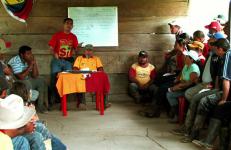
In this episode of Forms of Life, host Nato Thompson speaks with documentary filmmaker, writer and political scientist Dario Azzellini about community organizing and social movements.
The Communal State: Communal Councils, Communes, and Workplace Democracy.
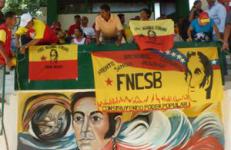
The particular character of what Hugo Chávez called the Bolivarian process lies in the understanding that social transformation can be constructed from two directions, “from above” and “from below.” Bolivarianism—or Chavismo—includes among its participants both traditional organizations and new autonomous groups; it encompasses both state-centric and anti-systemic currents.
An Interview with Dario Azzellini
Workers Control and/or Worker Cooperatives?

GEO: Dario, your co-edited book, Ours to Master and To Own, Workers Control from the Commune to the Present, presents a rich variety of worker control initiatives. These have taken place not only in Europe, but in Algeria, Argentina, Brazil, Canada, India, Indonesia, the USA, Venezuela, Yugoslavia, and other countries. Can you clarify for us what these examples have in common, and what you see as their importance?
